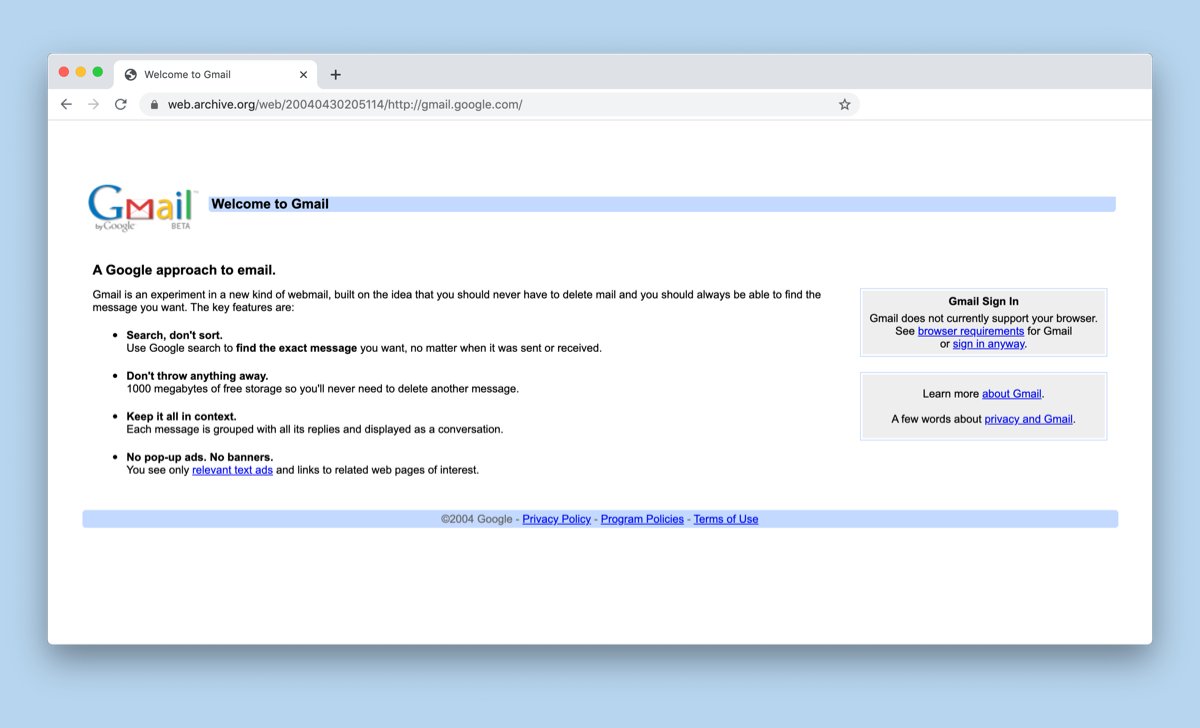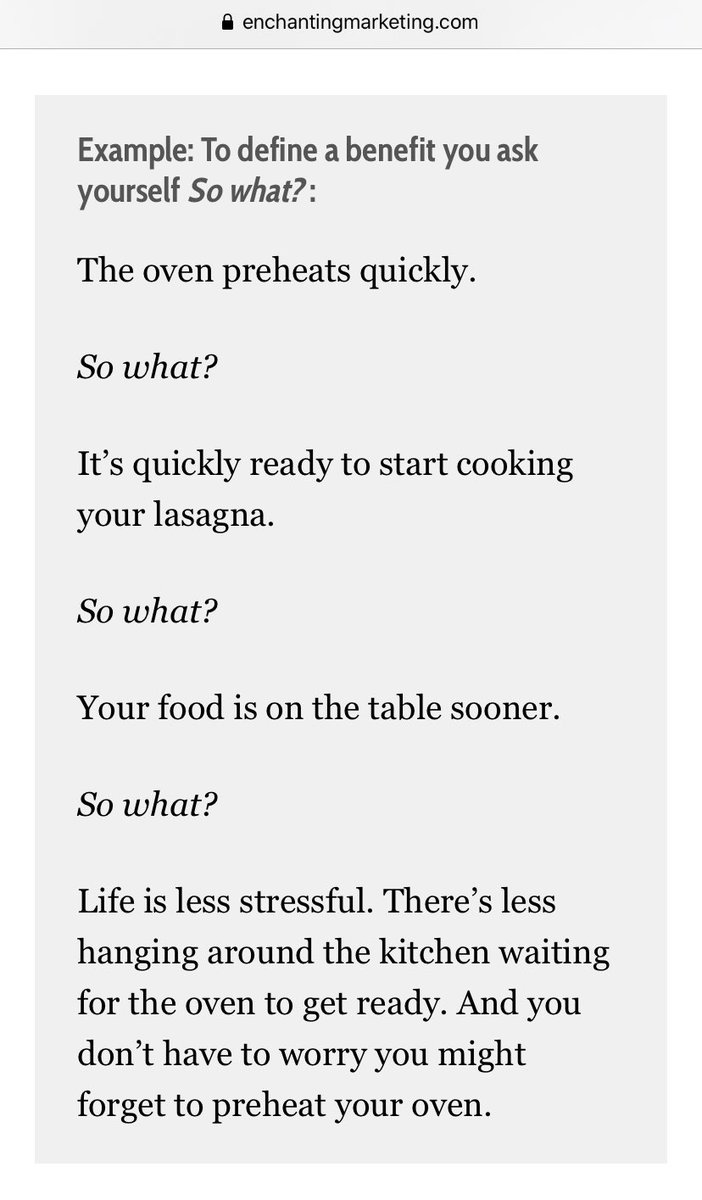Increasingly, I& #39;m skeptical of this copywriting advice: "Focus on benefits over features."
In practice, it makes the copy longer, more abstract, and harder to parse for potential customers.
When folks land on your website, they just want to know: "What does this company do?"
In practice, it makes the copy longer, more abstract, and harder to parse for potential customers.
When folks land on your website, they just want to know: "What does this company do?"
When people are looking for a solution, do they search:
"Easily manage your company& #39;s financial future on all your devices."
or do they type in:
"Accounting software?"
They& #39;re looking for ACCOUNTING SOFTWARE. Tell them what you do right away.
"Easily manage your company& #39;s financial future on all your devices."
or do they type in:
"Accounting software?"
They& #39;re looking for ACCOUNTING SOFTWARE. Tell them what you do right away.
There are so many websites now that are so desperate *not* to talk about features, that you can read the whole thing and still not know what the company does! https://twitter.com/brasmussen/status/1276612000785850369">https://twitter.com/brasmusse...
The problem with describing only "benefits," is that benefits are personal.
The benefit I want from a tool is different from what you& #39;ll want out of it.
People are looking for the features that will get them the benefits they want. https://twitter.com/noahwbragg/status/1276613019854757888">https://twitter.com/noahwbrag...
The benefit I want from a tool is different from what you& #39;ll want out of it.
People are looking for the features that will get them the benefits they want. https://twitter.com/noahwbragg/status/1276613019854757888">https://twitter.com/noahwbrag...
At the very least, tell visitors which product category you’re in.
“The customer tries to figure out what box to put you in; what frame of reference to put you in. And if you don& #39;t give them a box they have to make one up." – @aprildunford
“The customer tries to figure out what box to put you in; what frame of reference to put you in. And if you don& #39;t give them a box they have to make one up." – @aprildunford
Brand awareness + WoM + keyword searches drives most SaaS revenue.
If a customer is ready to buy, they don’t need to be told the benefits. They just need to know:
a) are they in the right place (does this product do what they want it to do)
b) can they trust you
If a customer is ready to buy, they don’t need to be told the benefits. They just need to know:
a) are they in the right place (does this product do what they want it to do)
b) can they trust you
Oddly, I see salespeople trying to sell me on benefits when I’m in the midst of purchasing.
Car dealership: “You’re going to love this car, it’s electric which means you’ll never need an oil change.”
If I’ve made it this far, I’ve already convinced myself of the benefits. https://abs.twimg.com/emoji/v2/... draggable="false" alt="😜" title="Winking face with tongue" aria-label="Emoji: Winking face with tongue">
https://abs.twimg.com/emoji/v2/... draggable="false" alt="😜" title="Winking face with tongue" aria-label="Emoji: Winking face with tongue">
Car dealership: “You’re going to love this car, it’s electric which means you’ll never need an oil change.”
If I’ve made it this far, I’ve already convinced myself of the benefits.
Multiple people have told to me they now go to the pricing page *first* because it shows them exactly what the product does, and what it’s features are.
https://twitter.com/trevmckendrick/status/1276743427472814080?s=21">https://twitter.com/trevmcken... https://twitter.com/trevmckendrick/status/1276743427472814080">https://twitter.com/trevmcken...
https://twitter.com/trevmckendrick/status/1276743427472814080?s=21">https://twitter.com/trevmcken... https://twitter.com/trevmckendrick/status/1276743427472814080">https://twitter.com/trevmcken...
So much marketing and sales advice relies on theories about how people come to a buying decision.
We need to constantly question these assumptions.
Most are tropes that are constantly repeated, but don’t have meaningful numbers behind them.
We need to constantly question these assumptions.
Most are tropes that are constantly repeated, but don’t have meaningful numbers behind them.
I wonder how much influence copywriting actually has on someone& #39;s intent to buy *in the moment*.
How many people land on a website for the first time, read the copy, and then click "buy?"
How many people land on a website for the first time, read the copy, and then click "buy?"
A marketing site should be for people who have a high level of awareness about the product category. (You& #39;re not teaching people about what a CRM is here.)
If you& #39;re educating the consumer, that should happen in blog posts, videos, tutorials, talks, Twitter, podcasts, PR, ads.
If you& #39;re educating the consumer, that should happen in blog posts, videos, tutorials, talks, Twitter, podcasts, PR, ads.
Gmail& #39;s original marketing site was beautifully simple:
"Gmail is a new kind of webmail"
(quickly describes "what is this?")
Features:
- Searchable
- 1000 MB of storage
- Grouped replies (displayed as thread)
- No pop-up ads
Who& #39;s the product for? Whoever wants these features!
"Gmail is a new kind of webmail"
(quickly describes "what is this?")
Features:
- Searchable
- 1000 MB of storage
- Grouped replies (displayed as thread)
- No pop-up ads
Who& #39;s the product for? Whoever wants these features!
Who lands on a random company website when they’re “just browsing,” anyway?”
Feels like companies are optimizing for folks just stumbling upon their site accidentally.
If folks are landing on your site, it’s because it was recommended to them (friend, search engine, article).
Feels like companies are optimizing for folks just stumbling upon their site accidentally.
If folks are landing on your site, it’s because it was recommended to them (friend, search engine, article).

 Read on Twitter
Read on Twitter



